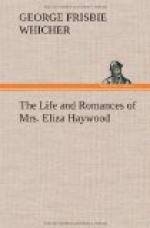From the standpoint of structure, too, “The Fortunate Foundlings” is an improvement over the haphazard plots of Mrs. Haywood’s early romances, though the double-barreled story necessitated by twin hero and heroine could hardly be told without awkward interruptions in the sequence of one part of the narrative in order to forward the other. But the author doubtless felt that the reader’s interest would be freshened by turning from the amorous adventures of Louisa to the daring deeds of Horatio, while a protagonist of each sex enabled her to exhibit at once examples of both male and female virtue. And in spite of inherent difficulties, she succeeded to some extent in showing an interrelation of plots, as where Dorilaus by going to the north of Ireland to hear the dying confession of the mother of his children, thereby misses Horatio’s appeal for a ransom, and thus prevents him from rejoining Marlborough’s standard. But there is nothing like Fielding’s ingenious linking of events and careful preparation for the catastrophe, nor did Mrs. Haywood make much out of the hint of unconscious incest and the foundling motif which her book has in common with “Tom Jones.” Occasionally also she cannot refrain from inserting a bit of court gossip or an amorous page in her warmest manner, but the number of intercalated stories is small indeed compared to that in a romance like “Love in Excess,” and they are usually dismissed in a few paragraphs. Here for the first time the author has shown some ability to subordinate sensational incident to the needs of the main plot.
When Mrs. Haywood’s inclination or necessities led her back to the novel four years later, she produced a work upon a still more consistent, if also more artificial plan than any of her previous attempts. “Life’s Progress through the Passions: or, the Adventures of Natura” avowedly aims to trace the workings of human emotion. The author’s purpose is to examine in “what manner the passions operate in every stage of life, and how far the constitution of the outward frame is concerned in the emotions of the internal faculties,” for actions which we might admire or abhor “would lose much of their eclat either way, were the secret springs that give them motion, seen into with the eyes of philosophy and reflection.” Natura, a sort of Everyman exposed to the variations of passion, is not the faultless hero of romance, but a mere ordinary mortal. Indeed, the writer declares that she is “an enemy to all romances, novels, and whatever carries the air of them ... and as it is a real, not fictitious character I am about to present, I think myself obliged ... to draw him such as he was, not such as some sanguine imaginations might wish him to have been.”




